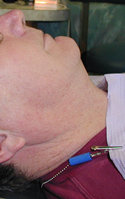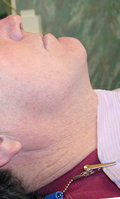The
danger of snoring
Although the frequent subject of humor, in many cases, snoring
is no laughing matter! Not only does snoring disrupt the
sleep cycles of other family members, but in the case of sleep
apnea, snoring can be a sign of a dangerous health problem.
Sleep apnea actually cuts off the flow of oxygen to the brain,
and in severe cases can cause serious damage.
How snoring affects others
Even
if sleep apnea is not indicated, the disruption of the
sleep cycles of family members can create a hazard.
Recent studies have indicated that repeated disruption
of sleep patterns can cause sufferers to perform motor
skills at or below the levels of individuals who are
legally intoxicated! So even if your snoring is not
a sign of sleep apnea, it is likely that your snoring
could be a real threat to your loved ones, because impaired
reaction behind the wheel of an automobile can lead
to disaster regardless of the cause.
What causes snoring?
Quite simply, snoring is caused by a partially obstructed
airway. When you sleep, the soft tissue and muscles
in your mouth and throat relax, causing your airway
to become smaller. If your airway becomes small enough,
your soft palate and uvula begin to vibrate when you
inhale and exhale. These vibrations are the cause of
the sound most people call snoring.
What can be done to stop snoring?
Many traditional treatments use cumbersome pressurization
equipment to open the airway. A simpler, and more effective
method is to keep the airway open by utilizing a simple
mouthpiece that maintains proper jaw alignment for
safe and healthful sleep. This mouthpiece, similar to
a sports mouthpiece, allows the patient to breathe through
either the nose or mouth.
|
|
On the left, without a snore prevention mouthpiece,
the patient's lower jaw relaxes and causes his airway
to constrict, resulting in snoring. On the right,
with the snore prevention mouthpiece in place,
the lower jaw is maintained in proper position so
the airway remains open, and snoring is eliminated. |
|
If someone is snoring in your house, please make an
appointment for a consultation.
|








